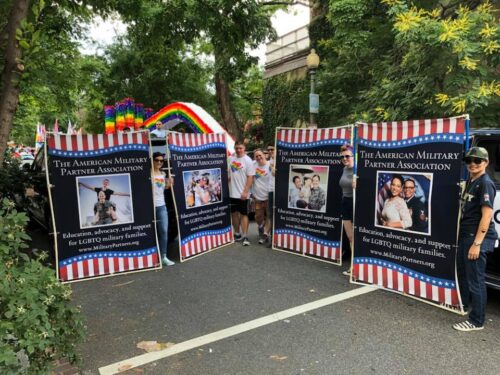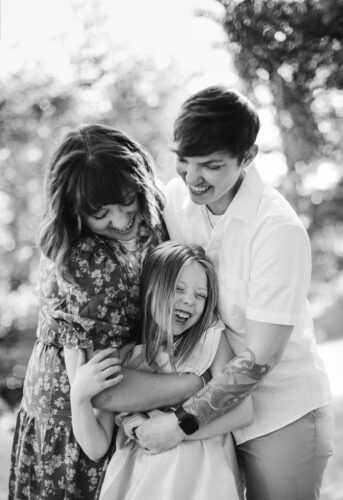By Jenn Edwards, Modern Military Communications and Outreach Coordinator, Navy spouse
This month marks 14 years since President Obama signed the repeal of Don’t Ask Don’t Tell (DADT) in late 2010. It also marks 13 years and one month since my wife joined the Navy.
We still endure struggles as a same-sex military couple, especially before the Defense of Marriage Act (DOMA) was struck down in 2013. But given the timing, I never felt the true impact of being one of the “hidden partners” of a service member. For those individuals, the repeal of DADT was a life-altering moment that finally allowed them to come out of the shadows after years of living in fear and openly join the diverse and unique community of military families.
DADT didn’t disappear on its own, though. It is thanks to the bravery of so many spouses before me that my family has always been able to live in the light. It is because of their continued dedication that we were eventually able to have our marriage recognized. And it is because of us, the spouses of today, that we will continue to be successful in our fight for equality for every member of our military community. On this DADT repeal anniversary, I find myself reflecting on the advocacy journey that brought me to today, while preparing for the fights ahead.
Our Rights: Expectations vs Reality
I was a military child for the first 12 years of my life. So in early 2011, when my-now wife told me she wanted to join the military, I had certain expectations. I knew what being a part of that community was like, with the support and camaraderie, so I threw myself behind her with my full enthusiasm. At my young, naive age of 25, I had no idea what DADT was, how it would impact my life, and how it would be officially repealed mere months later.
It didn’t hit me until I joined my wife to officially enlist, and the recruiter said a phrase that stuck with me for 13 years. He let her know that it “should be fine,” when discussing that my wife had a girlfriend. I know the look on my face showed my confusion. I thought, ‘Of course it should be fine…why wouldn’t it be?’
Had it been a year earlier, it wouldn’t have been fine. In the months to follow, I read news stories about those who had been fighting so hard before me, like Mr. C. Dixon Osburn and Major General Tammy Smith. Their stories brought me to tears, and reading about their bravery will forever be a core memory for me. I slowly began to realize that the community I thought I was joining wasn’t exactly going to welcome me with open arms. My eyes became open to how different things could have been for us.
If it was only a year earlier, I would have had to hide my relationship and pretend it didn’t exist, just like so many LGBTQ+ military families had to do for years. Because of their sacrifices, I could at least live in the open.
Officially Married…But Not Really
My wife left for Navy bootcamp on November 7, 2011, a month after the official implementation of DADT’s repeal. A year later we got married. Nothing changed, as one would normally expect when going from “military girlfriend” to “military spouse,” due to DOMA, which prevented the federal government from recognizing same-sex marriages, even when performed in a state that permitted them.
The experience of getting married at that time was unique. We each lived in states not yet performing same-sex marriages, so we drove to Clinton County, Iowa, to a 100-year-old house with bright red carpet that was transformed into a law office. We brought two witnesses, the judge read our vows, and then we signed papers. Officially married, right? Not really.

The author (left) and her wife
It was 2012, after all, and despite the repeal of DADT, the next fight was upon us: how do we get the federal government, including the military, to recognize our marriage? With DOMA the law of the land, I was officially listed as a “cohabitant” on my wife’s military paperwork — not her spouse. I had no military ID, no base access, and no spousal rights. None of the benefits bestowed upon military spouses, from healthcare to survivor’s benefits, were mine to claim.
When we moved together to her first duty station, I had to pay out-of-pocket to relocate from Colorado to Virginia, pay for my own medical insurance, and live without her Basic Allowance for Housing counting me as a dependent. DOMA was the only thing standing between me and my life as an official military spouse.
This was about much more than a label; it was about being a member of the community and having protections in place. Spousal benefits go far beyond monetary value. There were no trips to the ship on duty days to share a meal. There was no outreach from the ombudsman. I was in constant fear that if something were to go wrong or happen to her, I had no rights when it came to the military (or most other places for that matter) as I was “just her roommate.”
Down With DOMA
Despite the repeal of DADT, the existence of DOMA still barred families like ours from being official members of the military community. At the time, though, I was still young and had no idea what I — one person — could do to make change. So I watched and waited while others threw themselves into the fight. It’s one of my biggest regrets, thinking back to all I could have done during that time.
The fight of those who did take action succeeded: On June 26, 2013, the Supreme Court finally overturned DOMA. While it didn’t require all states to allow same-sex marriage or recognize same-sex marriages made in other states, it did require the federal government to recognize same-sex marriages conducted in states that legally offered it. This was one of the most impactful moments of my life. I will never forget that day; it was my wife’s 31st birthday, and I sat on the couch watching the ruling come out with tears streaming down my face.
I knew the monumental impact this ruling would have. The doors that it would open for so many. I remember thinking, “Wow, we can finally just be like everyone else and have all of the rights and benefits everyone else has and takes for granted.”
Once I was an official dependent, my wife’s Basic Allowance for Housing went up and we were able to buy a house — and we felt secure enough to start growing our family.
Finding My Voice
In 2015, I found a Facebook group called the American Military Partners Association (AMPA). It was my first real glimpse into the world of advocacy. I learned that since 2009, AMPA fought for equality for military service members and their families. I read about their accomplishments, how their members used their voices to make change, and how they created a space to celebrate families like ours where there never was one before.
That spring, our daughter was born. We were a whole family, legitimate and recognized. In 2018, a photo of my wife and I was highlighted on a banner (pictured below) at the Capitol Pride Parade. It was an eye-opening experience for our family to not only live out in the open, but to be displayed on a banner paraded through the streets of D.C.!

Our daughter is 9 now. I often look at her and remember how much I owe to those who took up the fight against DADT, then against DOMA, and again in 2022 when pushing for the passage of the Respect for Marriage Act. I respect the risks they took and the sacrifices they made. Their fight inspired me, and I know now that I can’t sit on the sidelines while others take up the fight. That’s not how change is made; that’s not how we protect our rights.
Today, I am proud to say that I am not silent. I use every opportunity I have to help uplift our community. It doesn’t feel like bravery, it feels like the thing I need to do. I’m lucky to have Modern Military by my side; by all of our sides.
Joining the Continued Fight
AMPA was founded in 2009, and in 2019, it merged with OutServe-SLDN, which was founded to support service members and their loved ones serving under DADT and DOMA. The 2019 merger led to the renaming and expansion of the organization, now known as Modern Military. Today, Modern Military remains dedicated to fighting for recognition, respect, and equality of military families like ours.
The fight didn’t end after DADT’s repeal; it just shifted. The dearth of rights for those living with HIV came into focus, and Modern Military, alongside partner organizations, worked together until they eventually saw victory. When transgender service members came under attack with a ban under the first Trump administration, Modern Military was on the frontlines combatting that ban. As fears of another potential trans ban are on the horizon, Modern Military is gearing up for another fight.
More recently, those pushing for an anti-equality agenda began targeting families with transgender and nonbinary youth. In the last few weeks, the House added a last-minute provision to the National Defense Authorization Act (NDAA), barring medically-necessary care for transgender and nonbinary adolescents under TRICARE.
Unlike many service member advocacy organizations, Modern Military immediately spoke out against the provision and worked tirelessly with lawmakers and advocates to try to block its passage in the House and Senate. We lost those battles, but Modern Military is now appealing to President Biden to veto the bill and protect transgender military youth.
We anticipate fights ahead on issues impacting active duty and reserve families, nonbinary and intersex people, and other LGBTQ+ communities. Even if these particular issues don’t personally affect you or your family, the outcomes of these decisions ultimately impact all of us. We all must play a role in ensuring equality and freedom for the entire community.

The author (left) with her family
Once again, Modern Military is dedicated to making sure that LGBTQ+ families are not used for political gain, collateral, or to advance an agenda.
I may have been young and inexperienced when I first joined this community, but the past 13 years have taught me that I cannot sit back and watch as members of our community continue to be at risk.
Our voices hold value, and we must use them today to ensure that our community, especially our trans service members, spouses, and children, continue to be protected and have the ability to serve. Alongside organizations like Modern Military, we are primed to face whatever may come head on.
It is through a united community, sharing one goal, that we will overcome systemic discrimination and be victorious in our goal of full equality for all military members and their families. I’m ready for the next fight. Are you?
© Copyright modern military association | EIN 52-1845000 | all rights reserved | legal & Financial
